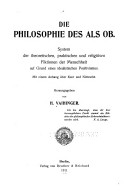The Philosophy of 'As if': A System of the Theoretical, Practical and Religious Fictions of Mankind (German: Die Philosophie des Als Ob) is a 1911 book by the German philosopher Hans Vaihinger, based on his dissertation of 1877.[1] The work for which Vaihinger is best known, it was published in an English translation by C. K. Ogden in 1924.[2] In 1935, a revised and abbreviated English translation by Ogden was published. The revised translation was based on the sixth German edition of the original work.[3]
 Title page of the German edition | |
| Author | Hans Vaihinger |
|---|---|
| Original title | Die Philosophie des Als Ob |
| Language | German |
| Subjects | Epistemology Immanuel Kant |
| Published |
|
| Publication place | Germany |
| Media type | Print (Hardcover and Paperback) |
| Pages | 368 (1968 Routledge edition) |
| ISBN | 978-1508663751 |
Within a philosophical framework of epistemology, the book argues for false premises or false assumptions as a viable cognitive heuristic. For example, simplified models used in the physical sciences are often formally false, but nevertheless close enough to the truth to furnish useful insight; this is understood as a form of idealization.
Summary
editVaihinger begins with an autobiography, discussing the origins of his philosophical ideas. He writes that he chose the title The Philosophy of 'As If' because "it seemed to me to express more convincingly than any other possible title" his view that, "appearance, the consciously-false, plays an enormous part in science, in world-philosophies and in life."[4]
The book presents an epistemology as well as a practical world and life view. Vaihinger describes human knowledge as erroneous and contradictory and asks how to explain the fact that one can still arrive at the right thing based on these false assumptions. Vaihinger's answer is that the assumptions are a practically useful fiction, and that knowledge can therefore only be pragmatically substantiated by the success that is achieved in its application. Religious and metaphysical views, like logic, are not true in an objective sense, since this cannot be established. Instead, the question had to be asked whether it was useful to act "as if" they were true.
Reception
editThe Philosophy of 'As if' influenced both Sándor Ferenczi since his 1913 letter to Sigmund Freud,[5] and Alfred Adler in his 1912 book Über den nervösen Charakter. Grundzüge einer vergleichenden Individualpsychologie und Psychotherapie (English translation: The Neurotic Constitution. Outlines of a Comparative Individualistic Psychology and Psychotherapy).[6][7] Though it contained the first use of the term "logical positivism", the logical positivists were generally dismissive of the work.[1] The philosopher Moritz Schlick wrote that Vaihinger's description of his philosophy as a form of "idealist positivism" was one of its many contradictions.[8]
The American journalist H. L. Mencken was scathing in his criticism of the book, which he dismissed as an unimportant "foot-note to all existing systems".[9] Michael J. Inwood writes that Vaihinger's theory "involves familiar, though not necessarily insurmountable, difficulties". He finds it open to criticism on the grounds that it involves a covert appeal to a non-pragmatic concept of truth. He also notes that the theory implies that claims about the utility of holding doctrines and even the theory itself are no more than useful fictions.[10]
In his biography, Philosopher at Large, Mortimer J. Adler notes that this book was one of his influences on his first book, Dialectic.[11]
See also
editReferences
edit- ^ a b Fine, A. (1993). Fictionalism. Midwest Studies in Philosophy 18 (1):1-18.
- ^ Kuehn, Manfred (1999). Audi, Robert (ed.). The Cambridge Dictionary of Philosophy. Cambridge: Cambridge University Press. p. 947. ISBN 0-521-63722-8.
- ^ Ogden, C. K.; Vaihinger, Hans (1968). The Philosophy of 'As if'. London: Routledge. p. v.
- '^ Vaihinger, Hans (1968). The Philosophy of 'As If. Fakenham: Cox & Wyman, Ltd. pp. xxiii-xlviii.
- ^ Freud, Sigmund; Ferenczi, Sándor; Brabant, Eva (1993). Brabant, Eva; Falzeder, Ernst; Giampieri-Deutsch, Patrizia (eds.). The Correspondence of Sigmund Freud and Sándor Ferenczi. Volume 1, 1908-1914. Harvard University Press. p. 498. ISBN 978-0-674-17418-4.
- ^ Adler, Alfred (2013) [1912]. The Neurotic Constitution. Outlines of a Comparative Individualistic Psychology and Psychotherapy. Abingdon-on-Thames: Routledge. ISBN 978-1-136-33037-7.
passim.
{{cite book}}: External link in|quote= - ^ Szasz, Thomas S. (1977). The Myth of Mental Illness. Frogmore: Paladin Books. p. 225.
- ^ Schlick, Moritz (1981). Hanfling, Oswald (ed.). Essential Readings in Logical Positivism. Oxford: Basil Blackwell. p. 87. ISBN 0-63112566-3.
- ^ Mencken, H. L. (1924) Philosophers as Liars. The American Mercury, October, Vol III, No.10, pp. 253-255. Quote (p. 255).
- ^ Inwood, M. J. (2005). Honderich, Ted (ed.). The Oxford Companion to Philosophy. Oxford: Oxford University Press. p. 941. ISBN 0-19926479-1.
- ^ Adler, Mortimer J. (1977). Philosopher at Large. New York: McMillan. p. 91. ISBN 0-02-500490-5.
External links
edit- Die Philosophie des Als Ob 7th, 8th ed. in German (1922), at archive.org